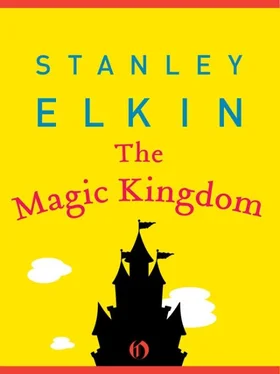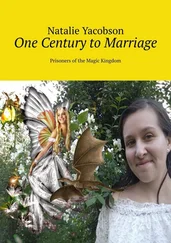Benny Maxine stirred and murmured in his sleep, and Moorhead leaned over to listen.
“If you can’t afford to lose, don’t gamble,” Benny mumbled.
Lydia Conscience giggled. Of all the children on the plane — indeed, of all the sleeping children in the world at that moment, those in their beds for the night as well as those merely napping — she was the only one who happened to be dreaming of the Magic Kingdom. She knew this because there was no busy signal, no distracting burr to flatten and compromise the call. And, though she was a generous child, it was pleasant to have the dream to herself, not, as in hospital, to have always to share — the attentions of the nurses, treats, visitors, the ward’s big telly — with the other patients.
The big park was not empty of visitors — that would have frightened her — but there were no long lines for the rides and shows and restaurants, no one in the clean rest rooms. There were a nurse and a doctor on duty in the cool, comfortable emergency tent but no one was there to cry out for first aid, not even a lost child to rumple a cot or mess the place up with candy wrappers, soft-drink bottles, an ice-cream cone, smashed and melting on the pavement. Except for the cheerful, efficient crew, Lydia had Captain Nemo’s plush, handsomely appointed submarine practically to herself, a fine view through the big portholes of the fleet’s other craft disporting like dolphins in the dark clear water — water, Lydia imagined, crisp and quenching in the throat as the ice in the packs that brought down her fevers and cooled her sleep.
Throughout the Magic Kingdom there was the same comfortable traffic, the thin, perfect crowds there only for scale, to set off the fantastic buildings and marvelous attractions, appearing, or so it seemed to Lydia, as they must have appeared in the original architectural sketches, well-groomed adults and their kempt, healthy children taking their ease on the wide benches and strolling at leisure through the park’s beautiful pavilions, the cunning vistas and landscapes, the visitors — Lydia was the exception — like line drawings, attractive figures in a brochure, well-behaved as guests at a garden party. Lydia was delighted by her unobstructed views, by her keen sense of privilege and status. On the river trip, for example, in the tiny steamer that vaguely replicated the African Queen with its chuffing, sputtering engine and its soiled and rumpled honorable mate, Lydia was comfortable enough during even the small boat’s most treacherous passages down the winding jungle river to load her camera, get exactly the right light reading, focus carefully, and shoot only after she was satisfied with her composition. When a fierce-looking hippopotamus submerged itself in the muddy waters alongside the ship, Lydia had sufficient presence of mind to ask the mate to turn off the engines so that she might get an even better picture when he reemerged into the air.
“She,” the mate said.
“Sir?” Lydia Conscience said quizzically.
“That hippo’s a female, miss,” the man informed her. “She does that for her babies. It ain’t playfulness, mademoiselle. The fact is, hips hate water about as much as cats do. It’s a hygiene thing. She’s setting an example for her cubs. They must be fairly close by or she wouldn’t have bothered. She’ll come up two more times, then make that noise they’re so famous for, that special- call noise that the cubs, no matter where they are and no matter what they’re doing, have to come running when they hear it. That’s the picture you want, ma’am. I’ll steer the boat over to where the water’s a bit clearer. You can get a shot of the cubs sucking her teats.”
“Really, Mister Bale!” Lydia said.
“It’s how they breathe, Fräulein,” the grizzled mate explained. “They get their air out of the cow’s milk. Something terrible is a hippopotamus’s breath, but them little ones’ lungs is so tiny they’d drown otherwise.”
“Nature is amazing,” Lydia Conscience said.
“It’s alarming, comrade. Me, I never went to no school,” the man told her. “I learned all my lore here on the river.” With a broad sweep of his arm he indicated the rubber duckies floating on the surface of the water, the mechanically driven, wind- up sharks, the needlework palm fronds along the banks.
Before the ride was finished and the conductor collected her ticket, Lydia had several other opportunities for fine photographs. She got a rare close-up of Tarzan pruning his treehouse and an absolute stunner of a cannibal picnic. Once again the mate silenced the engine and, putting his fingers to his lips, indicated that Lydia be quiet. Together they listened to the cheery campfire songs the cannibals were singing.
“I like this,” Lydia said when they were again under way. “Not being from a Third World country myself, it gives a London girl a grand opportunity to find out what really goes on.”
The hoary mate with the sad, steely eyes nodded judiciously.
“Wait till you meet Mickey,” he said.
“Mickey?”
“Mouse.”
“Oh, will I actually get to meet Mickey Mouse?”
“A private audience, memsahib.”
“A private audience!”
The mate lowered his voice. “Because you’re the only one who really wanted to come on the dream holiday.” It was true. Lydia Conscience had wanted to visit the Magic Kingdom for donkey’s years. For fear of hurting his feelings, she couldn’t tell the mate that Donald Duck and Goofy and Dumbo or even the 101 Dalmatians were her real favorites, but the shrewd old tramp, suspecting something of the sort, turned aside whatever objection she might have made. “He’s very kind, really. Not at all as standoffish as his critics make out. And he has wonderful powers. If he takes a liking to a kid there ain’t anything he wouldn’t—” But before he could finish, busy signals had begun to interfere with the dream. They were coming in from Holland, they were coming in from Spain. They were coming in from a hundred countries where little children were being set down for their naps.
Lydia was a generous child and ordinarily wouldn’t have minded. Disney World was a big enough place. It had been pleasant not to have to stand in line or deal with the crowds and, from a strictly practical standpoint, safer not to run the risk of bumping into people with her bloated, swollen belly, painful on sudden contact as a sore toe jammed in a door. And shameful, too. She was perfectly aware of how she must appear to strangers (P-R-E-G-G-E-R-S). And had long ago taken to wearing a cheap engagement and wedding ring so people wouldn’t get the wrong idea (or so they would, she giggled). But it was too spooky-making just now to have to run into that little blue girl. What was her name? Oh, yes — Janet. Janet Order. Who was just now being handed aboard. So Lydia Conscience ran and hid, her big tumor painfully sloshing in the amnion that had grown up around it.
In the smoking section toward the back of the plane, Janet Order had finally slipped into sleep. Janet was a child who welcomed sleep. It was the dreams. Janet Order looked forward to her dreams. In these dreams she’d found an infinite number of ways in which she was able to take on a sort of protective coloration. Sometimes she was an ancient Briton, one of that old Celtic tribe who painted themselves blue, or she dreamed of Mardi Gras, fabulous celebrations, the holiday makers behind incredible disguises, her own blue skin almost ordinary among the brilliant hues and shades of the gaudy, garish celebrators. Or was a huntress, a warrior, the bright blue cosmetics of her pigmentation there for war paint and terror, the honorable, acceptable hues of murder. Or at court at masquerades, or gloved at beaux arts balls behind soft veils or holding a lorgnette against her eyes like a stiff, slim flag. And sometimes the actual blue flag at the ceremonies and state occasions of imaginary nations. Or even — this was tricky, thrilling — as she marched past a reviewing stand, waving a large, heavy Union Jack in front of her in such a way that the flag’s staves and superimposed crosses hid her face while her body was protected behind the livid, rippling triangles of the blue field. She felt at these times quite like a fan dancer, quite like a tease. There were thousands of ways to protect herself. She dreamed of blue populations in blue towns and blue cities. She dreamed of herself cold and at peace in water, her lips and face blue in the temperature. Or exposed on a beach, blue and drowned.
Читать дальше












